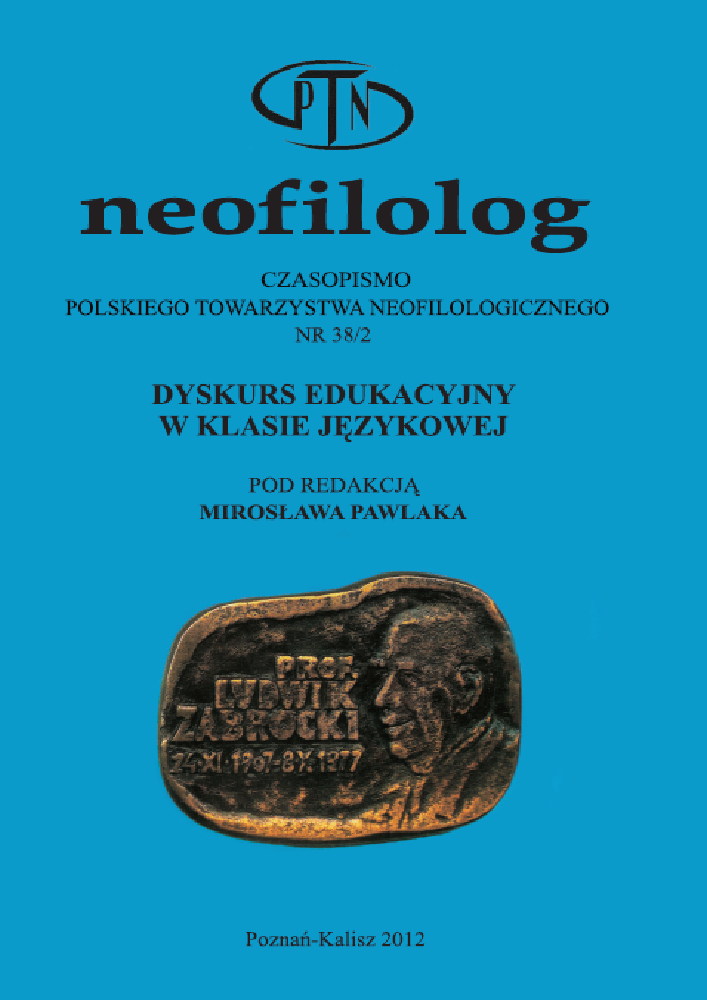Abstrakt
Examining different solutions implemented during foreign language lessons in different countries can be very useful. Firstly, noticing some innovative ideas in an authentic context in another educational system can inspire the introduction of some changes which can potentially raise the quality of foreign language in-struction. Secondly, seeing the same solutions in another educational system can confirm the effectiveness of existing methods and in this way may strengthen the intrinsic motivation of all involved in the teaching process of teaching for-eign languages. One of the most important elements of a foreign language les-son is educational discourse taking place in the classroom as it has the potential to affect all aspects of a particular class and to greatly influence learning out-comes. With this in mind, the author included educational discourse in a com-parative study of the processes taking place during foreign language lesson in two types of schools: the Polish upper secondary school and the British sixth form college. The article is divided into four sections. The first one deals with the literature related to discourse, especially discourse in education. In the sec-ond section, the structure and the scope of the research will be presented, in-cluding the research tools, the subjects of the study, the research questions, the scope and the organisation of the activities, and the factors potentially limiting and influencing the outcomes of the research. In the third part, the results of the study will be presented on the basis of the analysis of the data collected by means of questionnaires, observations and interviews. In the final section, the author will draw conclusions and make some pedagogical recommendations.
Bibliografia
Allwright, D. i Bailey, M. 1991. Focus on the language classroom: An introduction to class-room research for language teachers. Cambridge: Cambridge University Press.
Barnes, D. 1976. From communication to curriculum. Middlesex: Penguin.
Chaudron, C. 1990. Second language classrooms. Research on teaching and learning. Cambridge: Cambridge University Press.
Cook, G. 1989. Discourse. Oxford: Oxford University Press.
Cook, V. 2001. Second language learning and language teaching. London: Arnold.
Crystal, D. 1996. The Cambridge encyclopedia of the English language. Cambridge: Cambridge University Press.
Duszak, A. i Fairclouugh, N. (red.). 2008. Krytyczna analiza dyskursu. Interdyscypli-narne podejście do komunikacji społecznej. Kraków: Universitas.
Duszak, A. 1998. Tekst, dyskurs, komunikacja międzykulturowa. Warszawa: Wydaw-nictwo Naukowe PWN.
Hedge, T. 2008. Teaching and learning in the language classroom. Oxford: Oxford University Press.
Johnson, E. K. 1998. Understanding communication in second language classrooms. Cam-bridge: Cambridge University Press.
Longman dictionary of contemporary English. 1987. Harlow: Longman.
Longman dictionary of English language and culture. 1992. Harlow: Longman.
Majer, J. 2002. „Discourse analysis in foreign-language classroom research: An historical review”. [w:] English Studies XI. Acta Universitatis Nicolai Copernici. Toruń: Uniwersytet Mikołaja Kopernika. 3-20.
Nunan, D. 2000. „Hidden voices: Insiders’ perspectives on classroom interac-tion”. [w:] Bailey, K. M. i Nunan, D. (red.). Voices from the language class-room. Cambridge: Cambridge University Press. 41-56.
Oxford advanced learner’s dictionary. 2000. Oxford: Oxford University Press.
Oxford advanced learner’s dictionary of current English. 1988. Warszawa: Oxford Uni-versity Press.
Pawlak, M. 2000. „Optimizing interaction in the second language classroom”. [w:] Studia Anglica Posnaniensia 35: 234-258.
Pawlak, M. 2009. „Rola nauczyciela w kształtowaniu procesów interakcyjnych podczas lekcji języka obcego”. [w:] Pawlak, M., Mystkowska-Wiertelak, A. i Pietrzykowska, A. (red.). Nauczyciel języków obcych dziś i jutro. Poznań – Kalisz: Wydawnictwo UAM. 311-337.
Słownik języka polskiego. 1978. Warszawa: Państwowe Wydawnictwo Naukowe.
Słownik wyrazów obcych. 1980. Warszawa: Państwowe Wydawnictwo Naukowe.
The Collins paperback thesaurus In A-to-Z form. 1993. Glasgow: Harper Collins Publishers.
Walsh, S. 2011. Exploring classroom discourse language in action. New York: Routledge.
Licencja
Prawa autorskie (c) 1970 Beata Kouhan

Utwór dostępny jest na licencji Creative Commons Uznanie autorstwa – Bez utworów zależnych 4.0 Międzynarodowe.
Przedstawiany utwór (artykuł) upubliczniany jest na podstawie umowy z autorem i na licencji Creative Commons Attribution-NoDerivatives 4.0 International (CC BY-ND 4.0).
Użytkownicy mają obowiązek podania wraz z rozpowszechnionym utworem, informacji o autorstwie, tytule, źródle (odnośniki do oryginalnego utworu, DOI) oraz samej licencji;
- bez tworzenia utworów zależnych,
- utwór musi być zachowany w oryginalnej postaci.
Uniwersytet im. Adama Mickiewicza w Poznaniu zachowuje prawo do czasopisma jako całości (układ, forma graficzna, tytuł, projekt okładki, logo itp.).
